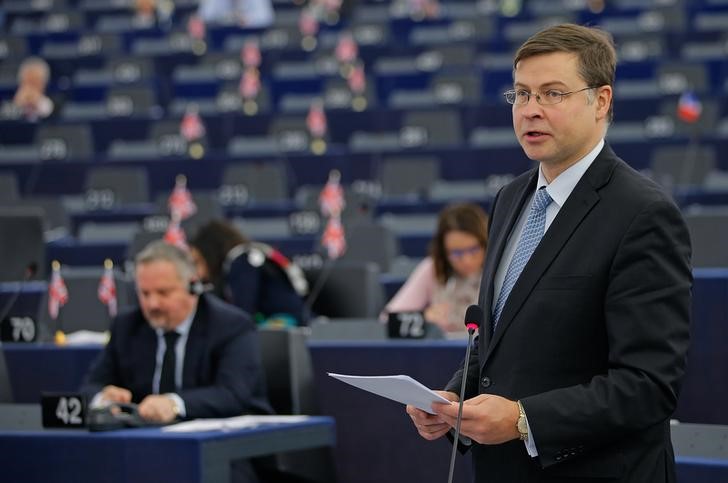By Jan Strupczewski
WASHINGTON (Reuters) - An agreement between Greece and its international lenders on a reform package that would unlock new loans and pave the way for debt relief talks is within reach, European Commission Vice President Valdis Dombrovskis said on Thursday.
"From the European Commission's point of view we see that we are making progress with Greece and finalising the review is clearly within reach," Dombrovskis told Reuters in an interview on the sidelines of the IMF meetings in Washington.
He said Greece was making progress in calculating the fiscal impact it expected from various reforms so that it can reach the 3.5 percent of gross domestic product target for its primary surplus in 2018, as agreed with lenders last year.
The reforms to achieve that target include a pension and personal income tax reform, the setting up of a privatisation fund and improving tax collection, Dombrovskis said, noting Athens made progress on all of them.
"Lots of work has been done in the last couple of months. Now if there is a will from all sides it can be done in a relatively short time," he said.
Talks on the review of Greek reforms are dragging on since last year also partly because the International Monetary Fund and euro zone governments cannot agree between themselves on some economic assumptions and scenarios of how the Greek economy might develop.
"We are working constructively with the IMF, there is a certain difference in assessment of the amount of fiscal effort needed to reach the targets, but those differences are bridgeable," Dombrovskis said.
Reaching a deal on the reforms is key because without it, Greece will not get new loans it needs to pay back maturing debt in July. A deal is also a precondition for any debt relief talks to start.
The chairman of euro zone finance ministers, Jeroen Dijsselbloem said on Thursday he did not expect a breakthrough in Washington this week, but that euro zone ministers will seek a deal next week in Amsterdam.
He said euro zone lenders were adamant that the key to a deal was sticking to the assumption that Greece's government had to reach a 3.5 percent of GDP primary surplus in 2018.
The IMF, one of the lenders to Greece, believes that asking Athens to maintain a surplus of that size for decades after 2018 - an assumption of the euro zone programme - is unrealistic.

The Fund believes the target for the surplus - the budget balance before debt servicing - should be lowered and that euro zone governments, who are Greece's main creditors, should offer the country deeper debt relief to compensate.